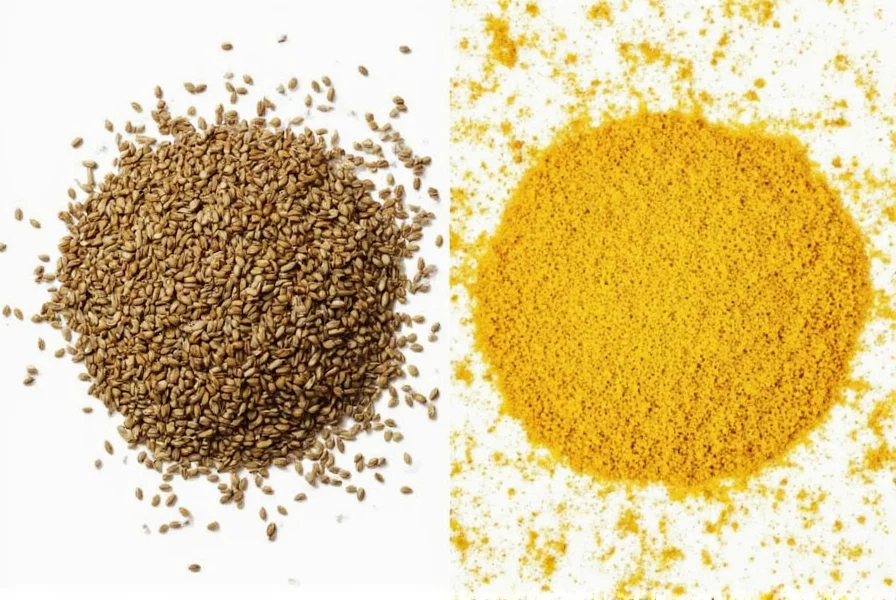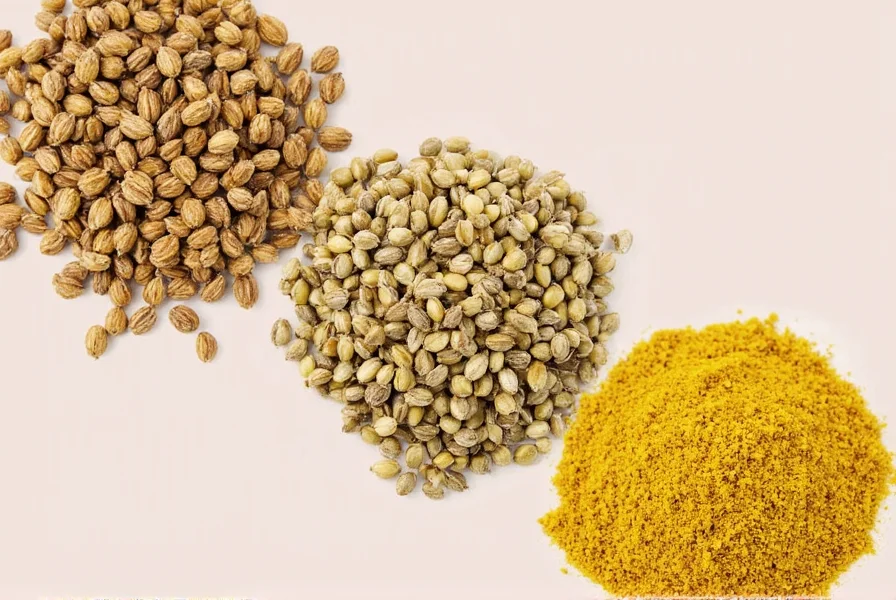Mustard seeds are a staple in many global cuisines, prized for their distinctive pungent flavor, aromatic qualities, and textural contribution to dishes. Whether you've run out of mustard seeds, have an allergy, or simply want to experiment with different flavor profiles, knowing effective substitutes can save your recipe without compromising quality.
Understanding Mustard Seeds' Culinary Role
Before exploring alternatives, it's essential to understand what makes mustard seeds unique in cooking. These tiny powerhouses contribute three key elements to dishes:
- Flavor profile - A complex mix of pungent, slightly bitter, and nutty notes that intensifies when heated
- Texture - Provides pleasant pops and crunch when tempered in oil
- Functional properties - Acts as a natural preservative in pickling and emulsifier in dressings
When seeking mustard seed alternatives, consider which of these elements is most critical for your specific recipe. This approach ensures you select the most appropriate substitute rather than a one-size-fits-all solution.

Top Mustard Seed Substitutes by Culinary Application
Not all substitutes work equally well across different cooking applications. Here's a detailed breakdown of the best alternatives for specific culinary needs:
Turmeric and Vinegar Combination
When you need to replicate both the color and tangy flavor of mustard seeds, particularly in curry dishes or marinades, a combination of turmeric and vinegar works remarkably well. Use 1/4 teaspoon of turmeric powder plus 1 teaspoon of vinegar or lemon juice for every teaspoon of mustard seeds called for in your recipe.
This alternative to mustard seeds is particularly effective for those with mustard allergies, as it provides the characteristic yellow hue without any allergenic components. The turmeric-vinegar blend works especially well in mustard seed substitute for pickling applications where color matters as much as flavor.
Wasabi Powder
For recipes where the pungent heat of mustard seeds is the primary characteristic you're trying to replicate, wasabi powder makes an excellent substitute. Reconstitute it with water according to package directions, using approximately half the amount of prepared wasabi as the mustard seed quantity specified.
This alternative shines in mustard seed replacement in salad dressings and sauces where the sharp bite is essential. Keep in mind that wasabi has a more intense initial heat that dissipates faster than mustard's lingering warmth, so timing of addition matters.
Horseradish
Freshly grated horseradish (about 1:2 ratio compared to mustard seeds) provides a similar sinus-clearing heat with a slightly different flavor profile. It works particularly well as a non-allergenic mustard alternative in creamy sauces, sandwiches, and as a condiment.
Unlike mustard seeds which develop flavor when tempered in oil, horseradish's potency is best preserved when added toward the end of cooking. This makes it ideal for finishing dishes rather than for tempering at the beginning of the cooking process.
Seed Alternatives for Texture and Tempering
When the textural element of mustard seeds is crucial to your dish—such as in Indian tempering (tadka) or pickling—consider these seed-based alternatives:
- Celery seeds - Nearly identical in size and texture, with a more herbal flavor (use 1:1 ratio)
- Fenugreek seeds - Provide similar visual appeal with a slightly sweeter, maple-like note (use 3:4 ratio)
- Poppy seeds - Offer comparable texture with a milder, nuttier flavor (use 1:1 ratio)
These alternatives work particularly well as a mustard seed substitute for Indian cooking where the tempering process is integral to the dish's flavor development.
| Alternative | Best For | Substitution Ratio | Flavor Notes |
|---|---|---|---|
| Turmeric + Vinegar | Curries, marinades, pickling | 1/4 tsp turmeric + 1 tsp vinegar per tsp mustard seeds | Earthy, slightly bitter, yellow color |
| Wasabi Powder | Dressings, sauces, dips | 1/2 amount of prepared wasabi | Sharp heat that dissipates quickly |
| Celery Seeds | Pickling, tempering, dressings | 1:1 ratio | Herbal, slightly salty |
| Fenugreek Seeds | Indian cooking, curries | 3:4 ratio | Sweet, maple-like, slightly bitter |
| Pre-made Mustard | Sauces, marinades, dressings | 1 tsp mustard per 1/2 tsp mustard seeds | Full mustard flavor without texture |
Special Considerations for Specific Cuisines
Different culinary traditions use mustard seeds in distinctive ways, requiring tailored substitution approaches:
Indian Cooking Substitutions
In Indian cuisine, mustard seeds are often tempered in hot oil to release their flavor. For authentic results when seeking a mustard seed replacement in Indian cooking, consider:
- For Bengali dishes: Use equal parts cumin seeds which provide similar tempering properties
- For South Indian recipes: Substitute with curry leaves fried in oil for comparable aromatic qualities
- For pickled vegetables: Try fennel seeds which offer similar preservative qualities
Pickling Applications
Mustard seeds serve both flavor and functional roles in pickling. When looking for a mustard seed substitute for pickling, celery seeds are your best option as they provide similar texture and mild flavor without overpowering the vegetables. Use them at a 1:1 ratio, and consider adding a pinch of turmeric for color.
Practical Substitution Tips
Successfully replacing mustard seeds requires more than just swapping ingredients. Follow these professional tips for best results:
- Timing matters - Unlike mustard seeds which develop flavor when tempered, many substitutes work best when added at different stages
- Adjust liquid content - Powdered substitutes may require additional liquid to prevent dryness
- Balance flavors - Compensate for missing elements (e.g., add a pinch of sugar if replacing the slight sweetness of yellow mustard seeds)
- Start conservative - Begin with less substitute than recommended, then adjust to taste
Dietary Considerations for Mustard Seed Alternatives
For those with mustard allergies or specific dietary needs, these alternatives provide safe options without compromising flavor:
- Allergy-friendly options - Turmeric-vinegar blend, celery seeds, and horseradish are naturally mustard-free
- Vegan considerations - All suggested alternatives are plant-based and suitable for vegan diets
- Low-sodium options - When substituting in place of prepared mustard, you control the sodium content precisely
Understanding these nuances helps create the perfect non-allergenic mustard alternative that meets both dietary restrictions and culinary expectations.
FAQ: Mustard Seed Substitutes
Can I use mustard powder instead of mustard seeds?
Yes, you can substitute mustard powder for mustard seeds at a 3:1 ratio (3 parts seeds to 1 part powder). However, this works best in sauces and dressings where texture isn't important. For tempering applications where the popping seeds are essential, mustard powder won't provide the same textural experience.
What's the best substitute for black mustard seeds in Indian cooking?
For black mustard seeds in Indian cooking, fenugreek seeds provide the closest flavor profile when used at a 3:4 ratio. They offer similar visual appeal when tempered and develop a comparable nutty aroma. For South Indian dishes specifically, curry leaves fried in oil can effectively replicate the aromatic qualities of black mustard seeds.
How do I substitute mustard seeds in pickling recipes?
For pickling, celery seeds make the best mustard seed substitute at a 1:1 ratio. They provide similar texture and a mild flavor that won't overpower your vegetables. Add a pinch of turmeric for color similarity. Unlike mustard seeds which contribute to preservation, celery seeds mainly provide texture, so ensure your vinegar solution has proper acidity for food safety.
Are there any nut-free alternatives to mustard seeds?
Yes, all the primary substitutes mentioned—turmeric with vinegar, wasabi powder, celery seeds, and fenugreek seeds—are naturally nut-free. This makes them excellent options for those with nut allergies seeking a safe mustard seed alternative. Always verify that your specific product hasn't been processed in facilities with nuts if you have severe allergies.











 浙公网安备
33010002000092号
浙公网安备
33010002000092号 浙B2-20120091-4
浙B2-20120091-4